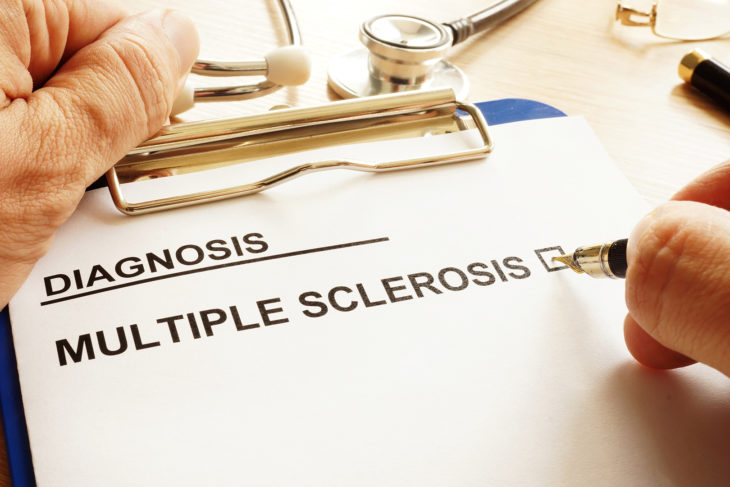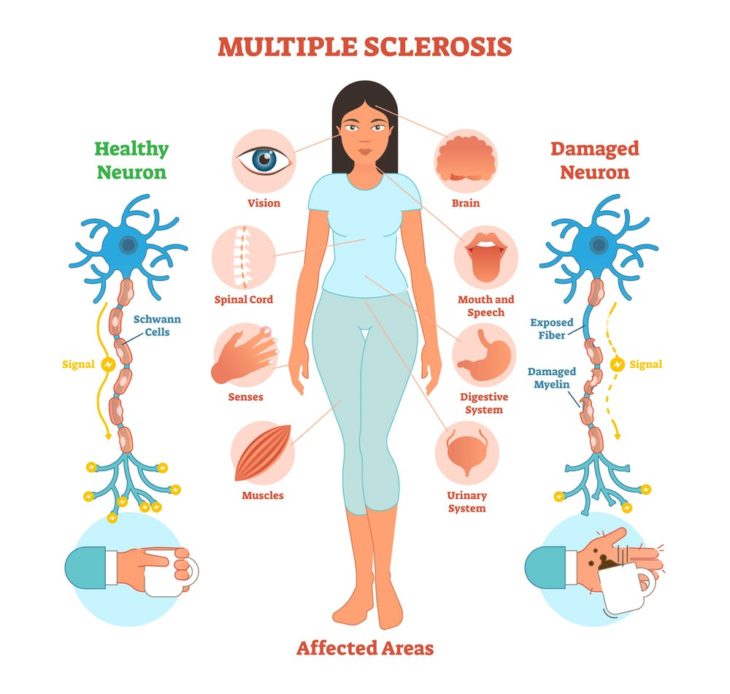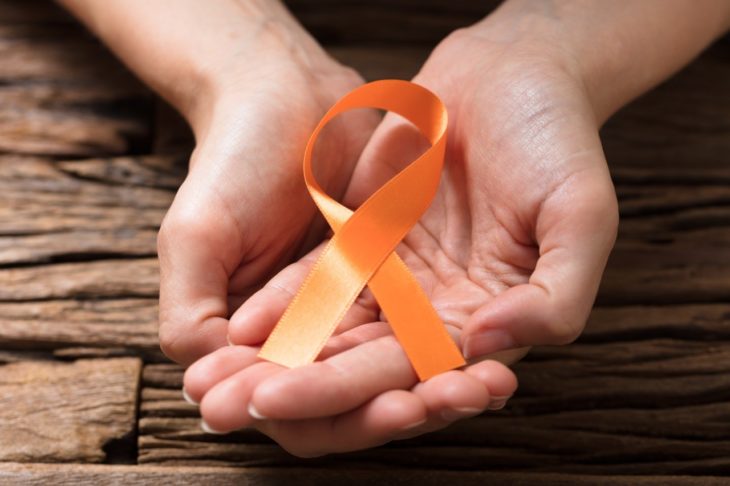I was 17 years old and sitting in a dimly lit, poorly ventilated doctor’s office next to an incredibly nervous mother. I never imagined that the following six simple words would change my life forever: “You have spots on your brain.”
Excuse me? What does that even mean? I thought.
Ten years later, I still question the doctor’s choice in words and his flippant tone. What he meant was this: you have Multiple Sclerosis.
I don’t know how long I will be with this boyfriend, but MS is a lifelong illness that gets progressively worse. Significant others often become caretakers. ‘I know it’s kind of a lot to sign up for, but I’m hoping it’s not a deal breaker. Is it?’ I asked, my heart thumping.

Source: Dr. Ali Ghahary
At 17, I had absolutely no idea what MS was. Only that former Mouseketeer Annette Funicello had it—I had seen her selling teddy bears on QVC and I couldn’t stop staring at her wheelchair. All I knew was that three days after I graduated from high school (I started school young and was already a freshman at Saint Mary’s College by this time), I woke up not being able to feel both of my legs. I could walk, but the only sensation I had was my body weight pushing down on the ground. Thank you, Sir Isaac Newton.
Round after round of doctor appointments followed. One doc thought I had a kidney infection. Another thought I had a bulging disc in my back. Thanks to my cruddy insurance plan, I had to wait six months to see that neurologist who gave me the correct, spotty diagnosis.
So what is MS? It’s a chronic, disabling autoimmune disease that attacks your central nervous system, leading to relapses that can include paralysis, blindness, and/or loss of speech. The “spots,” as they were so referred to, are actually legions on your brain caused by your immune system attacking myelin, which is a fatty material that protects nerve fibers. MS has no cure. You can only hope to use medicine to prolong time between relapses, treat them with medication, and figure out a way to deal with persistent fatigue. There are four kinds of MS, which all have complicated, technical definitions. I was diagnosed with relapsing-remitting MS, meaning that I would most likely have a normal life but would experience relapses from time to time.
On paper, it doesn’t sound so terrible. But in my head, it was a travesty. For six months, I’d had no idea what was happening to my legs—every little pain was something new. The summer after high school, I’d gone to Austria for a German language program and climbed the Alps unable to feel my legs. I’d started college having no idea what my body had dealt me. I thought knowing what was wrong would be a huge relief.
However, my post-diagnosis life was even scarier. I was told to research MS on my own, which led me to reading multiple websites with scary and tragic stories by women who could not walk anymore or who had lost their jobs because of this disease. Of course, that was the year 2000; the internet was much scarier back then.
My sophomore year, during finals, I had a big freak-out. I had overloaded on classes that semester and, being the perfectionist I was back then, I stressed out so much I thought I was starting to lose feeling in my foot. I called my parents in the middle of the night. Their advice: if it’s bad enough, go to the hospital; if not, try to get some sleep and calm down. I didn’t have a good sense of how MS progressed and I was constantly insecure about my life. But I tried my best to calm down. I ended up turning to food, gaining something like 45 pounds in college. I also became increasingly dependent on my boyfriend at the time. He was a saint and put up with a lot.

Luckily, three years later, my parents found a well-respected neurologist for me at the University of Michigan and he set the record straight. He put me on medicine right away in order to prevent more legions and relapses. Finally, I was actively taking control of my health. Unfortunately, most MS medications come in shot form, and I am not talking about tequila. Not only did I have to remember to inject myself with medicine daily, but I also had to overcome my fear of needles.
MS is not a disease most people know a lot about. I often have to educate any roommates, friends, and boyfriends about it. In fact, I recently had this conversation with my current boyfriend. We were lying in bed, and I just decided to put it out there. “This one time, I lost feeling in both my legs and it was really scary. I ended up going to the doctor and he diagnosed me with Multiple Sclerosis,” I said.
I explained to him the basics of the disease. “I just thought you should know in case I wake up one day and I say I have to go to the hospital,” I rambled, nervously. I don’t know how long I will be with this boyfriend, but MS is a lifelong illness that gets progressively worse. Significant others often become caretakers. “I know it’s kind of a lot to sign up for, but I’m hoping it’s not a dealbreaker. Is it?” I asked, my heart thumping.
He put his arms around me and kissed me. “No,” he said.
I have a feeling he’ll be around for a while.
For me, it’s hard to think about the future, especially a future with this disease that is so unpredictable. Summer is always the worst time of year for my anxiety. Increasing temperatures and sunny days at beaches freak me out. All of three of my relapses have occurred in June or July, when Washington, D.C. becomes a sauna.
I remember my first one vividly. I was an intern at the U.S. Department of State. I woke up unable to feel my entire left arm. Instead of going to the doctor right then, I went into work. Of course, my coworkers noticed that I was very quiet and sad—not my cheery, over-achieving self. When I told one of them why, he told me to call my parents and tell them he was driving me to the emergency room. Nothing will ever be scarier than that visit to the ER, my first relapse alone in a strange hospital. My wonderful roommate stayed with me as long as she could, but, eventually, visiting hours ended; he had to leave me on my own and terrified. Not even the fun tranquilizers worked. Three days and three grams of powerful steroids later, I was released from the hospital able to feel all my limbs again.
So this summer, when I should be excited about going on bike rides with my boyfriend, getting drinks at outdoor happy hours with friends, and taking a vacation, I’m trying to figure out what I can do to stay in the air conditioning without going full-on hermit.

Source: The News Strike
It’s not only the summer that worries me. I’m worried about being able to build the career I want. I’m currently a contractor at the State Department but someday (and this might sound fairly atypical for a girl my age) I’d like to be the Drug Czar. (Err, Czarina?) While I am protected under the Americans with Disability Act, I still worry that I could be fired for missing too much work because of a relapse.
And, obviously, I am terrified that my next relapse will leave me blind or paralyzed.
Yet, I’m only 27. I have an entire life to live, and as long as I make healthy choices, I should continue to be fit and strong. I know I have to drag my butt to the gym instead of sitting on my couch. I know I have to limit my alcohol consumption and try to eat organic. Just this year, after reading one too many articles about how terrible it is for you, I felt that I had to say good-bye to my beloved Cherry Coke Zero in order to wean myself off sweeteners. The jury is still out on whether my health is better because I’m soda-free.
So, I’ll see what hand my MS deals me in the coming years. Hopefully, less spots and more fun.
Original by Maureen Russell
